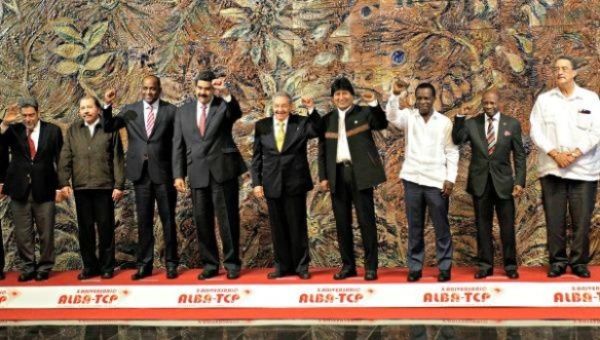Latin American regional bodies back the oil-rich nation against U.S. tactics; some warn they are designed to provoke regime change.
The U.S. Department of State imposed a second round of financial sanctions in February. These included visa restrictions on Venezuelan government officials, whom the U.S. accuses of human rights violations in relation to last year’s wave of right-wing violent protests.
The U.S. went ahead with the sanctions, despite a
unanimous declarationrejecting U.S interference in the region at the Community of Latin American and Caribbean States (CELAC) Heads of State Summit in Costa Rica in January.
CELAC, which brings together all 33 Latin America and Caribbean nations and is, in many ways, an alternative to the U.S.-dominated Organization of American States, expressed its “strong repudiation of the application of unilateral coercive measures that are contrary to international law.”
Similarly, in December, after an earlier round of U.S. sanctions on Venezuela, the heads of states of the Common Market of the South (MERCOSUR), which includes Brazil and Argentina, expressed “their profound rejection of the law that applies sanctions” against Venezuela and expressed “firm support and solidarity with the government and the Venezuelan people.”
The Presidents labelled these a violation of “the principle of non-intervention in the internal affairs of other countries and do not contribute to stability, social peace and democracy in Venezuela.”
February’s fresh round of unilateral sanctions also sparked
outrage throughout the region. It prompted Venezuelan President Nicolas Maduro to meet with Union of South American Nations (UNASUR) Secretary General Ernesto Samper, to ask for the regional bloc's mediation on the interventionist actions carried out against the country by the United States.
President Maduro said that other regional leaders had informed him that U.S. Vice President Joe Biden had been pressing other countries to “isolate” Venezuela. Maduro also said he had proof that the U.S. Embassy in Venezuela was attempting to bribe officials in order to turn them against his government.
As a result, a
special commission, comprised of the foreign ministers of Brazil, Colombia and Ecuador, met with Samper and Venezuelan Foreign Minister Delcy Rodriguez, during which they criticized U.S. interference in Venezuela, saying it put regional stability at risk. The foreign ministers also agreed to work in support of the establishment of a direct dialogue between Caracas and Washington.
Following the meeting, Samper expressed concern regarding the unilateral sanctions carried out by the U.S., and requested that Uruguay — the blocs’ pro-tempore leader — convene an extraordinary meeting of the UNASUR foreign ministers, which is expected to take place in February.
Previous emergency meetings of UNASUR foreign ministers have been reserved for extreme crises and serious threats to regional security. The most recent emergency meeting was convoked in July 2013, when several European countries closed their airspace to the presidential aircraft of Bolivian president Evo Morales, who was accused of harboring National Security Agency whistleblower Edward Snowden.
Following the earlier round of U.S. sanctions, UNASUR member states met late December condemned U.S. sanctions which they stated, “infringes the principle of non-intervention in the internal affairs of other States”.
In the latest sign of support from Latin American and Caribbean nations, the Bolivarian Alliance for the Peoples of Our America (ALBA) group of nations expressed Tuesday its “firm and strong opposition to the imposition of unilateral measures by the government of the United States, against the government and the Venezuelan people.”
The 11-nation regional body labelled the U.S. move an attempt toward regime change, and part of wider U.S activities “destabilizing the Bolivarian government in order to achieve its overthrow, or a change in its political regime chosen by the people.”
ALBA offered its support to ending any divisions between the two nations, and offered “to promote constructive dialogue on equal terms between the Bolivarian Republic of Venezuela and the United States of America.”
Such regional backing for Venezuela looks set to continue with Ecuadorean Foreign Minister
Ricardo Patiño announcing that his country will host a meeting in the coming days with the foreign ministers from CELAC countries to discuss the situation in Venezuela and to review the evidence presented by President Maduro.
As Latin America goes through its second fight for independence — first from Spain, now from the United States — its regional integration bodies are playing an important role in defusing crises, interventions and and threats towards the region stemming from the dominant power in the North.


